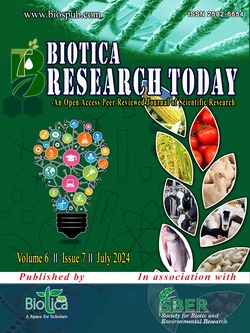
Computer Aided Drug Design (CADD): A New Frontier in Plant Disease Control
K.K. Chetan*
Division of Plant Pathology, ICAR-IARI, New Delhi (110 012), India
Divyashree
Division of Plant Pathology, Navsari Agricultural University, Gujarat (396 450), India
Ashwini J.H.
Division of Plant Pathology, ICAR-IARI, New Delhi (110 012), India
Vanapalli Lohitha Sai Shree
Division of Plant Pathology, ICAR-IARI, New Delhi (110 012), India
Basavraj A.D.
Division of Plant Pathology, ICAR-IARI, New Delhi (110 012), India
DOI: NIL
Keywords: Agrochemical, CADD, Disease management, Molecular modeling
Abstract
Plant diseases pose a significant threat to global food security. While traditional methods like pesticides and resistant crop varieties have been employed, the development of novel control strategies remains crucial. Recent advancements in understanding the molecular mechanisms of plant pathogens have opened new avenues for targeted interventions. Computer-aided drug design (CADD), a technique successfully applied in pharmaceutical research, holds immense potential for the discovery of effective agrochemicals. CADD is a specialized field that employs computational techniques to simulate how drugs interact with their target molecules. This approach relies on principles from quantum mechanics and molecular modeling to explore methods like structure-based drug design, ligand-based drug design and database searching. By predicting binding affinity, CADD has been instrumental in identifying potent compounds against plant pathogens. The rapid growth of genomic and structural data, coupled with sophisticated computational tools, creates unprecedented opportunities to leverage CADD for addressing plant disease challenges.
Downloads
not found
Reference
Baig, M.H., Ahmad, K., Roy, S., Ashraf, J.M., Adil, M., Siddiqui, M.H., Khan, S., Kamal, M.A., Provazník, I., Choi, I., 2016. Computer aided drug design: Success and limitations. Current Pharmaceutical Design 22(5), 572-581. DOI: https://doi.org/10.2174/1381612822666151125000550.
Krithika, S., Chellaram C., 2019. Theoretical approach on targeting plant fungal pathogenic proteins against naturally isolated compounds from Chitiniphilus shinanonensis. Asian Journal of Pharmaceutical and Clinical Research 12(12), 138-142. DOI: https://doi.org/10.22159/ajpcr.2019.v12i12.35639.
Shanmugam, G., Jeon, J., 2017. Computer-aided drug discovery in plant pathology. The Plant Pathology Journal 33(6), 529-542. DOI: https://doi.org/10.5423/PPJ.RW.04.2017.0084.
Ugariogu, S.N., Duru, A., Abah, C.V., 2020. Natural product chemistry and computer aided drug design an approach to drug discovery: A review article. International Journal of Pharmacognosy and Chinese Medicine 4(3), 207-219. DOI: https://doi.org/10.23880/ipcm-16000207.
